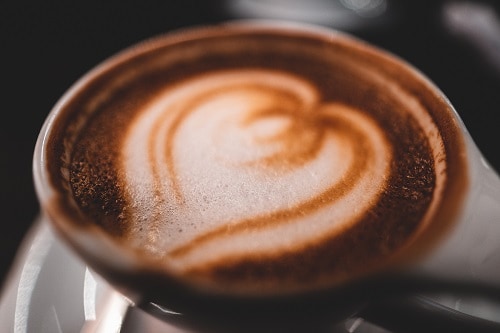The earthy fragrance of coffee tugs me back to tender times. To honey-sweet and tear-salted moments spent with the women who have graced my life, steaming mugs between us on one or another kitchen table.
In my family, girls of three or four got coffee while we helped our mothers in the kitchen. Ma would fill her cup then pour just a splash of coffee in my mug and top it with warm milk and lots of sugar. I felt so grown up sipping my sugary brew, helping my mother roll little dimples into the gnocchi so that they wouldn’t be gummy. Ma wore a dishtowel slung over one shoulder and a cigarette that bobbed like a maestro’s baton when she spoke. “I hope we got enough for everybody,” she would fret as she turned the third skillet-full of sizzling meatballs. “Maybe I should make a ham too, just in case. Always better to have too much than too little, eh?” This philosophy plagues my cooking to this day.
While she waited for dough to rise or water to boil, Ma would sit for a stolen moment. I could sometimes lure her in these coffee breaks to tell me stories. Once she told of working in the airplane factory during The War. Another time over coffee and Christmas cookie dough she told about the best present she ever got as a kid. It wasn’t hard to recall. She had so little. An uncle sent a child-size set of real dishes. Smooth white crockery with a delicate green pattern at its edge. The gift seemed too extravagant to her for just one girl to have, so she gave each of her girl cousins and neighbors a cup or plate for her own. For herself she kept the tiny pitcher that some sixty years later she still used for a cream when company came.
The soft Italian melody barely audible in my mother’s voice was stronger one generation back. Perhaps the coffee was a little stronger too.
We went to Gramma and Grampa Graziani’s house for holidays. Hoards of aunts, uncles, cousins and in-laws gathered for meals that took days to prepare and hours to eat at a long mountain range of tables of varying elevations, linked together with mismatched tablecloths.
Gramma and the gaggle of round Italian aunts mixed and rolled out pasta on the kitchen table. The women worked in concert with the percussive accompaniment of the coffee pot perking on the stove. The dented tin percolator chugged and hissed, the glass bubble on top allowing a sneak peak at the rich brown brew.
I rose early, before my siblings and cousins, to sit on the radiator that served as seating behind the gray Formica table in Grandma’s kitchen. A precise thickness of newspaper sheets was required so that I could enjoy the radiator’s warmth without suffering a burn on my rear end. It was worth the risk.
The hair-netted, aproned, fleshy-chinned flock of women would chatter and chirp as they cooked. The flashing blade of Gramma’s knife sliced velvety pasta into long, uniform strands, despite its blurred speed and her seeming disregard for aim. Then she’d hang the pasta tendrils to dry from broomsticks set across chair backs. I’d nibble doughy bits of raw noodles while the women told stories of neighbors and relatives.
Sipping my sweet coffee-milk, I waited for conversational crumbs. I sat with my lips turned inward peering over the rim of my mug, making myself small and silent so that they might forget about me and speak in unguarded women’s talk.
They calculated wedding days to babies’ births. “Ach, that baby did not look premature to me”, I remember a great aunt saying. To which another exclaimed, “Oh Madone! He practically had teeth!” As they all shook their heads, their extra chins wobbled in unified disapproval.
A long and detailed story about the wedding night of a particularly big and tall groom and a petite bride piqued my prepubescent interest. I listened with thumping heart and dry lips as the size of the man’s feet and the thickness of his thumbs were discussed as though they were forebodings both of danger and excitement for the diminutive bride. Just as the meaning of these anatomical clues was to be revealed, the deft storyteller raised a brow to me and slipped into Italian without a so much as a missed beat in her conversational rhythm. As the pitch of her voice rose, fingers covered mouths agape. Eyes widened. Older women in cotton house dresses tisk tisked while younger ones wearing slacks snickered. English resumed only in time for Gramma’s baffling punchline. “And she almost bled to death that night. But now she’s always wearing a smile.” The women cackled knowingly. Terrified, I made a silent vow never to marry a tall man, though I could not then explain why.
Coffee breaks have served as time-outs for mothers and wives and have saved the lives, I’m sure, of more than a few toddlers and teens unaware of their mothers’ homicidal capacities. Laughter and tears between girlfriends at coffee houses have rescued more than one marriage in my group of friends. And coffee has been comfort in sorrow-filled times. An elixir. A balm to sooth fears and soften the harsh blows of loss.
At a funeral home, my siblings and I made Ma’s final arrangements over instant coffee in Styrofoam cups, lightened with non-dairy creamer. The nervous funeral coordinator, whose hairline had receded quite unfairly for his twenty-odd years, told us of the options for what we could do with our mother’s cremains.
Cremains?
“Yes,” he said, “cremains!” After he’d said the word about a dozen times the cardboard canister of Creamora on the dingy coffee table seemed oddly suspect to me. Punchy with exhaustion and raw from grief, the comedic and possibly sinister connection between cremains and Creamora yanked me into uncontrollable peels of inappropriate laughter. Then, one by one, four of the five of us lost our dignity with tear-strewn faces. Only my oldest brother managed to keep himself contained. There’s always one straight man. His stoic politeness made the rest of us laugh all the harder. The funeral guy stared at us in humorless bewilderment with an expression that could’ve indicated anything from abject horror to mild indigestion. Maybe we were his first funeral. I spied him bagging groceries at Pack ‘n Save some time after that. Probably for the best. Funeral homes really should serve real coffee. In good china. It’s only right.
My mother’s three-pound can of Folgers and Gramma’s dented percolator wouldn’t be found in the kitchens of my contemporaries. Now it’s roasted Arabica, rain-forest friendly, double decaf, non-fat with cheery yellow packets of sweetener not invented in my mother’s lifetime. But it’ll always be coffee milk to me. Over coffee we women have ogled each others’ newborns, worried about our growing children, redesigned careers and laughed about how silly our men can be, but how deeply we love them still. Over coffee we’ve shared our dreams and healed our heartache.
Mother to daughter, sister to sister, friend to friend. Coffee is our excuse to rest, our reason to gather, the way to slow our crazy lives. The smell of the coffee, the music of language, the warmth of the kitchens; all of these are passed as indelibly down the generations of women as anything held in our DNA. Perhaps with men it’s frosty beer shared over greasy motors with ball games blaring that serve as social lubricant and wound salve. But I am not a member of that club.
So I tip my mother’s tiny china pitcher and watch ribbons of cream lighten the harsh darkness of my cup. Whether alone with my thoughts, sharing stories around a kitchen table, or ending a lovely evening among friends, I always take this time to smell the coffee and to remember.

